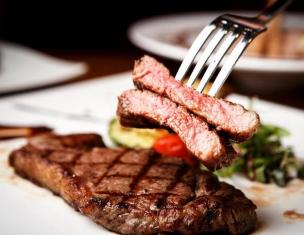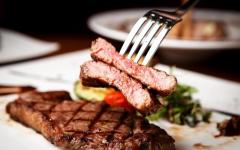I can't wait for you to do a fourteen-day trial of the Stimulus Diet to see if I'm right. The experiences you will have cannot be described in a thousand chapters.
In the meantime, I have come up with something to increase your enthusiasm to the extreme. You are ready?
You'll lose more weight and more fat on the Atkins diet than any other diet you've ever tried.
In other words, this diet will give you a boost, which in scientific parlance is called a metabolic advantage. This is what will allow you to lose weight on the Atkins diet by consuming the same amount of calories as you consumed while gaining weight. And if on my diet you consume fewer calories, which is quite likely, this will allow you to lose weight much faster. Remember that I said that in terms of explaining weight gain and loss, the calorie theory has enough flaws to be considered dubious. For someone who has worked in this field for a long time, nothing is more obvious.
So let me tell you right here and now that the colossal dietary reward, which I call the exchange advantage, is an arena of controversy and remains so, despite numerous studies confirming its reality. I began to describe this amazing phenomenon long before I heard the very expression “exchange advantage.” In 1973, the American Medical Association reproached me with this term. Concerned about the extraordinary success that Dr. Atkins's Diet Revolution had achieved in promoting low-carbohydrate diets at a time when the AMA preferred to support advocates of low-calorie, low-fat diets, the association convened a council of carefully selected nutritionists who attacked the low-carbohydrate diet and, in particular, my book as the most shining example this direction.
Literally all of their criticisms could have been discounted or easily refuted simply by reviewing the scientific reports published up to that time, but one of the stray arrows was astonishingly accurate because it brought my attention to one of the most remarkable benefits of a low-carb diet for weight loss. The board's verdict read: "There is no scientific evidence to suggest that the low-carbohydrate ketogenic diet has a metabolic advantage over more traditional weight loss diets."
Since I have reviewed the scientific research on ketogenic and low-carb diets over the past fifty years and have found nothing but support for the phenomenon that I am about to demonstrate to you in some detail, I must admit that I am more than a little taken aback by this statement. Do experts really think that none of these studies actually happened, or that the studies that did happen have no value? Since the AMA has never gotten around to refuting the obviously erroneous statement I made above, and since the metabolic advantage remains one of the most visible benefits that an overweight patient receives the very minute he goes on the Atkins diet, I decided to introduce you to the genuine the scientific facts behind the benefits you will experience while dieting.
I know that many of you are far from science and get confused when doctors start talking to you in their professional jargon. But I promise you that if you pay close attention to what I tell you, you will gain insight into some of the most exciting scientific research that anyone interested in losing weight has the chance to learn about. Before the end of the chapter, you will receive a small reward from me: using the example of one of my patients, you will learn how this principle affects a living person and his diet.
To begin, let me introduce you to the scientific achievements of two brilliant and meticulous English scientists, Professor Alan Kekwick and Gaston L.S. Pavan, whose seminal experiments on mice and obese humans resulted in a pioneering principle, mechanism, rationale and flawless experimental confirmation that a low-carbohydrate diet - even a high-fat diet! - has an important metabolic advantage over balanced, or traditional, low-fat diets. Let me point out that my allies in this pseudo-controversy were not some madmen writing in a provincial medical journal, but the most prominent representatives of British scientific circles researching the problem of obesity. Professor Kekwick was the director of the Institute of Clinical Research and Experimental Medicine at the prestigious London Middlesex Hospital, and Dr. Pavan was a senior research fellow at the same hospital's medical center. The AMA experts could not have been unaware of their research or its far-reaching significance.
The saga of Kekuik and Pavan began in the early fifties, when they were struck by many studies suggesting that differently formulated diets produced different rates of weight loss. They read the exciting clinical research of DuPont employees conducted by Dr. Alfred W. Pennington, as well as articles by German and Scandinavian scientists that showed patients successfully losing weight while restricting carbohydrates. Then they did a study on obese people and found that those on a diet that was 90% protein, and especially a diet that was 90% fat, lost weight; when they were put on a diet with the same number of calories, but consisting of 90% carbohydrates, they stopped losing weight.
The potential significance of this unexpected discovery so impressed Kekwick and Pavan that they devoted nearly two decades of their work together to discovering how and why the theory that all calories were the same turned out to be so blatantly wrong. They then repeated the previous animal studies in humans and found the same phenomenon: a low-carbohydrate 1,000-calorie diet produced significant weight loss, while a high-carbohydrate 1,000-calorie diet produced very little weight loss. Then they showed that on a balanced diet of 2000 calories, their subjects did not lose weight at all; when their diet consisted mainly of fat, the same obese people managed to lose weight even if they were given 2,600 calories. A typical example was their patient J.W., who lost 10 pounds in three weeks on a 2,600-calorie low-carb diet but did not lose an ounce in eight days on a 2,000-calorie balanced diet.
The skeptics who claimed that “a calorie is always a calorie” were shocked and decided at all costs to refute this intellectual bomb that Kekwick and Pavan dropped on them.
This resulted in a whole stream of scientific research. One of them, the authors of which were T.R.I. Pilkington and colleagues, was published in The Lancet in 1960. However, it looked at the 1,000-calorie level at which almost everyone loses weight, and only three subjects were kept at 32 grams of carbohydrates, which is the upper limit of their intake for the ketogenic diet. But if you look at their data, you'll see the same amazingly rapid weight loss on restricted carbohydrates that Kekwick and Pavan demonstrated, except that Pilkington and his colleagues threw out the first twelve days of a low-carb diet in one fell swoop - which is exactly and it was the only way reconcile the conclusion that all low-calorie diets produce the same results with the experimental data obtained. What was the course of their reasoning? They stated that a low-carb diet causes water loss. Where did they get this from? Unlike Kekuik and Pavan, they did not study water balance to prove this thesis. With the self-satisfaction of people who have isolated themselves from life, akin to that displayed by Galileo’s contemporaries, who argued that the Earth could not possibly revolve around the Sun, Pilkington and his comrades concluded that their preconceived theory was an immutable truth.
I'm amazed by the AMA nutritionists who, desperate for support, even cited this study. If you do this too often, you can develop a reputation for not knowing what two times two is.
But Kekuik and Pavan stood their ground. Their data showed that water loss is only a small part of overall weight loss. They spent the next two years conducting a study on mice in an exchange chamber. By measuring carbon loss in feces and urine, they were able to show that on a high-fat diet, mice excreted a significant amount of unused calories in the form of our friends - ketone bodies, - as well as citric, lactic and pyruvic acids. At the end of the experimental period, they analyzed the amount of fat in the animals' bodies and found that mice kept on a high-fat diet were much less fat. However, AMA experts did not even bother to look at this study, although it was published in the prestigious American journal Metabolism.
The story of Kekuik and Pavan does not end there. Proving the reality of the metabolic benefits of an ultra-low-carb diet, they discovered and isolated a substance contained in the urine of people on a low-carb diet that, when administered to mice, caused the same metabolic processes observed in mice on a low-carb diet and was an indicator of fat breakdown. Fat melted away before our eyes, ketones and free fatty acid levels rose and, most importantly, the excretion of unused calories in urine and feces rose from the normal 10% to 36%! This substance was called a fat mobilizing substance (MLS). MLV is a weapon for your exchange victory. It allows you to eliminate some of the unused calories from your body that you couldn't get rid of as easily on a low-fat diet.
Kekuik and Pavan attributed hormonal properties to MLV, and at least four other groups of experimenters, who came to this topic in different ways, believe that they also discovered fat mobilizers. Thus, the theory that you have an exchange ally in the fight to maintain weight has been confirmed by many researchers.
Following a diet requires strong willpower and motivation. Without dietary restrictions, you will not be able to achieve a slim figure. In what cases is it necessary to limit yourself in food and how to maintain the diet to the end?
Do you need to lose weight
Dietary nutrition is a well-formulated diet aimed at solving health problems. Gentle diets are indicated for diseases of the gastrointestinal tract, as well as during the recovery period after abdominal surgery.
In this case, following a diet is mandatory.
Lack of a proper diet can lead to exacerbation of diseases, pain and deterioration in well-being. Today the word “diet” is associated with losing weight. And it is right. Even therapeutic diets help get rid of extra pounds ov. Modern nutritionists offer hundreds various systems
nutrition aimed at achieving slimness.
How to determine whether you need to lose weight? First, you need to understand whether you are overweight.
- The following symptoms may indirectly indicate the presence of weight problems:
- dyspnea;
- difficulties when climbing above the 2nd floor;
- increased sweating;
- loss of strength in hot weather;
swelling. Important! Determine availability excess weight
Weight problems are just the tip of the iceberg. Most people with overweight The body has elevated cholesterol levels, which can lead to the development of cardiovascular diseases.
It is a proven fact: the life expectancy and quality of life of obese people is much lower than that of thin people. Being fat is unfashionable today. Hence the complexes, self-doubt, problems at work and in personal life.
If weight loss is necessary, then it is extremely important to adhere to the recommended diet for the sake of health and beauty.
Which option to choose

Today, experts offer hundreds of different diets. You can choose a popular technique or opt for an unconventional solution.
Before choosing a diet, it is important to determine your goal. If you want to quickly lose a few kilograms by a certain date, then it is better to stick to a quick mono-diet. It involves eating one type of product for several days. Following such a diet is very difficult, but the results will be impressive. In addition, mono-diets significantly save the budget. You should not get carried away with such nutrition - this is only a short-term way to gain harmony.
If the number of extra pounds exceeds a single digit, then the choice should fall on a long-term nutrition system. It should become a way of life for many years. Then the excess weight will go away, and the habit of eating a balanced diet will prevent the extra pounds from returning.
swelling. When choosing a diet, it is important to consider your own taste preferences, mobility and financial resources.
Can't imagine life without meat, cheese and scrambled eggs? Then the best solution There will be a protein low-carb diet. She allows you to eat chicken, cottage cheese, eggs, fish and other hearty delicacies.
A protein diet is unlikely to satisfy sweet tooths and fruit lovers. It is better for them to choose a low-calorie diet. It will allow you to vary your diet and add healthy sweets.
Based on the principle of preference, you can find a good fruit or vegetable diet for your loved one.
For women who cook for family and children, a separate food diet is perfect. It allows you not to prepare dietary food separately. The main thing is to follow the order of use various types products and do not mix them.
Once the choice is made, you can try testing the diet. For example, have breakfast and lunch as recommended. Too difficult? It may be worth looking for alternative options.
In any case, you should not expect an easy path. A diet requires the mobilization of all personal resources for the sake of an ideal figure.
The right motivation

After choosing a particular nutrition system, it is important to determine the start date of the diet. No circumstances should be a reason to postpone it for a few more days.
Don't start a diet right tomorrow! Any drastic changes to the menu require preparation, otherwise the risk of failure is too high.
Get rid of prohibited foods in the refrigerator and on the shelves in advance. Buy vegetables and fruits. Carefully think through the menu and master a couple of new recipes. Thematic communities on the Internet will help a lot!
A week before the expected date, avoid fried and fatty foods. Drink more fluids, limit your consumption of starchy and sweet foods. Don't eat 2-3 hours before bedtime. Gradually getting used to the new menu will make the strict diet easier.
So, the hour has come, the diet has started. Difficulties may arise in the first 3 days after starting. They are caused by getting used to a new diet. The important thing here is not to give up, but to wait out the difficulties.
The body may protest even after 2-3 weeks of the diet. It is important to check whether this is due to a deficiency of vitamins and microelements.
What symptoms may indicate this:
- hair loss;
- a sharp deterioration in the condition of the skin and nails;
- prostration;
- visual disturbances, “midges” before the eyes.
If you notice at least one symptom, it is better to start a gradual exit from the diet by adding new nutritious foods to the menu.
It is possible to prevent exhaustion of the body.
It is important to control the balance of your diet by following these rules:

During a diet, it is difficult to do without some familiar but unhealthy foods. Some people want fried potatoes, others lack sweets, others dream of sweet soda.
swelling. To make the diet less painful, plan one “legal” violation of the ban per week. For example, every Saturday morning you can enjoy a small portion of a chocolate bar. The anticipation of a small holiday will brighten up everyday life with a restrictive menu.
It is important not to abuse the opportunity to pamper yourself. A small portion of encouragement in the morning and increased physical activity will prevent the return of the hated kilograms.
If you want the diet to be effective, then adhere to the following rules:
- Do not eat 2-3 hours before bedtime. At night, you can allow yourself a glass of kefir without sugar.
- Avoid fried foods and alcohol.
- Take more walks and walks. This burns calories and provides a distraction.
- Do not eat bread and buns made from premium white flour.
- Reduce the consumption of any spices - salt, pepper, herbs. This trick will suppress the feeling of hunger.
A balanced diet will instill good eating habits and motivate the body to get rid of fat deposits.
We force ourselves to hold on
Making a decision to go on a diet does not guarantee success. It is important to withstand it without disruption and systematically move towards the result.
Tips on how to stick to your diet every day, despite the difficulties:

Important video to definitely lose weight
Are you still afraid of dieting failures? Then you should watch the useful video below.
The video will help you understand that many people experience similar problems, and there is nothing wrong with it. You just need to set your goal correctly and understand all the possible consequences.
conclusions

Forcing yourself to follow a diet is not difficult. In order not to get frustrated and think about food all the time, it is important to find joy in new experiences, emotions and hobbies. Be sure to play sports, buy yourself a painting by numbers, or start visiting a dance studio. Treat yourself to a spa session or treat yourself to a massage. Life is full of bright colors, and food is not the only source of pleasure.
Look for motivation, set a goal, praise yourself for every small victory. Do not forget that the absence of excess weight is the key to beauty, health and longevity.
Excess weight can negatively affect a person's emotional state, as well as health. The person may lose self-confidence and motivation. It is good for your health to adjust your diet by replacing unhealthy foods with healthy ones and reducing portion sizes. For the diet to give the desired result, you need to get enough nutrients from food and not limit your diet too much. Any diet will be more effective if you also have good habits and you will be positive.
Steps
Planning
- Fighting diabetes. If you have diabetes, you definitely need to take care of your diet. Reducing or eliminating sugar is the key to living a healthy life with diabetes.
- Reducing the risk of heart disease. Foods that normalize blood cholesterol and help reduce belly fat help prevent cardiovascular disease.
- Losing excess weight after pregnancy. Everyone gains weight during pregnancy, but chances are you'll want to lose it and get back to your old figure.
- Preparing for the beach season. With the arrival of warmer weather, many people begin to lose weight in order to look better in beachwear. Sometimes small changes in your diet are enough to lose weight “to the sea”.
-
Pump up your body. Perhaps you would like to strengthen your muscles and gain weight through muscle mass. In this case, you will need to eat more protein since protein is responsible for building muscle.
Make sure you can limit your diet. Before making dietary changes, discuss your diet with your doctor and ask whether it will be harmful to your health.
Analyze your eating habits. Before you change your habits, you need to understand what they are. Track what, when and where you eat to better understand your routine.
- Keep a food diary. Keep it in the kitchen or on your bedside table and write down everything you ate (full meals, snacks, and even those few spoons of something you just wanted to try), the time and place where you ate (for kitchen table, on the sofa, in bed).
- Keep a diary on the Internet. There are apps and websites you can use to track your nutrition. If the application is on your phone, it will be convenient for you to enter all the data there on time.
-
Find out what you have problems with. We all have different eating habits and different triggers for overeating. If you know what makes you eat more than you need, it will be easier for you to break the habit.
- Stress. One of the main reasons for overeating is stress. When a person is tense and restless, he often tries to eat stress. If this is an issue for you, you may want to learn to cope with stress in other ways or buy healthier foods.
- Fatigue. A tired person tends to choose junk food. If you know that you often eat when you're tired, try to take more time to rest and go shopping feeling rested and calm.
- Boredom or loneliness. Have all your friends left? Can't find anything to do? If you overeat when you're on your own, try to find new activities and hobbies that get you out of the house more often and that take your mind off food.
- Excessive hunger. If you put off eating because you're busy, by dinnertime you won't be able to think about anything but food, and you'll probably eat more than you need. If this problem is familiar to you, try to find time to snack during the day.
How to choose healthy foods
-
Learn more about what calories are. Most people who lose weight count calories, but many do not know how many calories their body needs. We think the fewer calories you eat, the faster you can lose weight, but it's important to consider not only how many calories you consume, but also where you get them from.
- Men eat on average 2,600 calories a day, while women eat about 1,800. If you want to lose weight, you'll need to cut back on calories, but you should eat at least 1,200 calories a day. If you eat less, the body will go into starvation mode and will cling more tightly to fat deposits.
- Contact a nutritionist or trainer to calculate your caloric intake for weight loss. Consider your physical activity level.
- Try to get your calories from healthy sources. Eat more foods with fiber (whole grains) and protein (lean meats). This way you will feel fuller longer and have more energy.
- Avoid "empty" calories. For example, alcohol and potato chips do not saturate the body, but at the same time bring extra calories.
-
Follow the generally accepted recommendations of nutritionists. A person must receive all the nutrients he needs and eat a balanced diet. This means that you should eat a certain amount of foods from all groups, without giving preference to any one of them. You should also eat a varied diet (for example, eat not only apples, but also other fruits). It is important that added sugars and saturated fats account for no more than 10% of the calorie intake for each item. Try to consume no more than 2,300 milligrams of salt daily. In addition, there are recommendations regarding the amount of certain foods that you should try to eat every day. For example:
- Eat 9 servings of fruits and vegetables every day. One serving of fruit is half a cup of chopped fruit or one small piece of fruit. One serving of vegetables is a glass leafy vegetables or half a cup of chopped vegetables.
- Eat 6 servings of grains daily, with at least half coming from whole grains. One serving of grains is a slice of bread or half a cup of cooked rice or pasta.
- Eat 2-3 servings of dairy products per day, preferring low-fat products. 1 serving of dairy products is half a glass of milk.
- Eat 2-3 servings of protein per day. One serving of meat is 85 grams, or the size of an adult's palm. One serving can also be considered one large egg, 1 tablespoon peanut butter, 30 grams walnuts, 50 grams of beans.
- Try to eat foods of all colors of the rainbow: blueberries, red apples, asparagus. Different colored foods contain different nutrients and vitamins.
-
Eat more lean meat and fish. To build muscles, proper operation immune system and metabolism, the body needs protein. To get the most benefit from protein, choose foods with high content protein and low fat.
Eat whole grain cereals. In whole grain cereals, all parts of the plant are preserved: the sprout, the hull and the endosperm. During processing, the sprout and shell are often removed, causing the plant to lose 25% of its protein and at least 17 nutrients. To get the most benefits from grains, look for whole grains.
Eat healthy fat. Not all fats are harmful - some should definitely be present in the diet. Monounsaturated fatty acid and polyunsaturated fats are beneficial: they reduce the level of “bad” cholesterol (low-density lipoprotein) in the blood and increase or maintain the same level of “good” cholesterol (high-density lipoprotein), and also normalize insulin and sugar levels.
- Monounsaturated fatty acids are found in avocados, canola oil, nuts (almonds, cashews, pecans, macadamia nuts, and nut butters), olive oil, olive oil, and pistachio oil.
-
Avoid trans fats. Trans fats are oils saturated with hydrogen, so these fats are often called hydrogenated on product packaging. These fats increase the level of "bad" cholesterol and reduce the level of "good" cholesterol in the blood, increase the risk of heart disease, cancer, stroke and can lead to infertility.
Read the information on the packaging. Pay attention to nutritional value product - so you can choose healthy foods. The packaging often lists the serving size and nutritional value per serving.
Prepare your own food. Eating in a cafe or buying semi-finished products is very convenient and simple, but this way you do not control the quantity of food and the quality of the products. To lose weight, you need to cook your meals at home. This way you can choose a healthier cooking method (baking instead of frying) and fresh ingredients.
- Plan your meals in advance. Making a plan for the week will make it easier for you to stick to your plan and avoid excess food. It will be easier for you if you prepare healthy meals in advance and store them in the freezer.
- Make cooking fun. Buy yourself new knives or a nice apron. This will motivate you to spend more time in the kitchen.
-
Have snacks between meals. Yes, you can have a snack! Eating frequently keeps your metabolism level and forces your body to burn more calories. Healthy snacks will suppress hunger and prevent you from overeating.
- It is important to choose healthy foods. Buy fresh fruits, vegetables, nuts, low-fat dairy products. For dinner, you can make hummus and eat it with sliced cucumber.
- Keep snacks on hand at work. If you have roasted almonds on your desk, you are unlikely to decide to snack on cookies in the office kitchen.
-
Add flavor to your products. You will want to eat something if it tastes good. To make your food tastier, you can add salsa to it. Drizzle sauce over baked potatoes and you won't have to put butter on them. This way you will not only get rid of excess fat, but also add some vegetables to the dish.
What foods should you avoid?
- Many of these diets require giving up an entire food group, such as carbohydrates. However, a complete diet must include all nutrients. Avoid diets that prohibit a specific food group.
- Some extreme diets can cause problems with health and well-being. Crash diets often involve eating extremely few calories, which is very unhealthy. Eat as many calories as your body needs and choose healthy foods.
Avoid extreme diets. You might want to try out some fad diets for yourself. There are always news in the media about celebrities who have managed to lose weight on some kind of diet, but it is important to remember that such diets do not always work and, more importantly, they can be dangerous to your health.
-
Avoid processed foods. Processed foods and fast food contain large amounts of substances that you shouldn't eat: salt, saturated fat, sugar. Of course, if you occasionally eat a burger or processed food, nothing bad will happen, but you should not abuse such food.
- Saturated fat should account for more than 10% of your calories for the entire day. If you eat no more than 1,500 calories a day, that means you can eat no more than 15 grams of saturated fat. Fast food burgers typically contain 12–16 grams.
-
Avoid sugary drinks. Sugary drinks, especially soft drinks, lead to weight gain and obesity. Liquid calories do not cease to be calories - they must be taken into account in total number calories per day, so try to eliminate sugary drinks from your diet.
If necessary, avoid certain foods. If you have a medical condition that requires you to limit certain foods, you will have to be even more responsible with your food choices.
Think about why you need a diet. If you clearly understand what your goals are, it will be easier for you to choose a nutrition system that you can stick to and that will lead you to the result you want.
Lifestyle changes
- Start by replacing just one meal per day. To avoid drastic changes, try eating just one healthier meal a day at first. Since the changes will be smooth, you won’t feel like you’ve been robbed of all the best things, and it will be easier for you to adjust.
- Eliminate or replace one snack per day. If you always drink coffee and cookies at three o'clock, try replacing the cookies with a peach or skipping this meal altogether. You can simply replace the fatty coffee drink with green tea with lemon.
-
Start moving more. Proper nutrition- deposit healthy image life, but the results will appear faster if you also start playing sports. Research has shown that changes in diet combined with exercise have a positive effect on overall health and help you lose weight.
- Try to exercise at least 60 minutes a day. You can divide this hour into several intervals. For example, you can walk to work instead of driving, or take the stairs instead of the elevator.
- Go outside. People who exercise outdoors enjoy physical activity more. Find a place to exercise near your home, go for a walk, or find a sports ground in your local area and exercise there.
- Call a friend. It will be easier for you to stick to your plan if you have company. Invite a friend to join you for a yoga class or a walk after work.
-
Try to get more rest. If you don't get enough sleep, your body may begin to gain weight. When a person sleeps little, his body produces more of the stress hormone cortisol. Because of this, a person begins to eat more junk food to calm down.
-
Fight stress . There is a connection between stress and weight gain. If a person is nervous, the body produces cortisol, which causes weight to accumulate. Typically, fat deposits appear in the abdominal area. For the diet to be effective, it is important to get rid of stress.
- Exercise regularly. Physical activity releases endorphins in the body and improves your mood.
- Take deep breaths. Conscious breathing is very effective method combat stress. Take a deep breath and exhale slowly. This will slow your heart rate and help you calm down.
-
Pamper yourself from time to time. Efficient system rewards will help you stay enthusiastic and stick to your plan.
- Plan a day when you can afford to deviate from the plan. Try eating what you want once a week. This will give you something to look forward to and won't make you feel like you're completely limiting yourself.
- Don't ban yourself from any food completely. A person always wants to get what he cannot. Don't tell yourself that a certain product is prohibited. Small deviations from the diet can even be beneficial.
-
Track changes. To make it easier to track changes, consider a rating system.
- You can use the same food diary that you kept at the very beginning, only now you can record healthy foods there. Compare weeks, track red flags and progress.
- Use the online application. Enter all the data (initial weight, desired weight, daily meals) into the application, which will calculate everything for you. Many apps have recipes healthy dishes and the opportunity to communicate with like-minded people.
- Weigh yourself every week. It is important not only what is written in the diary, but also the number on the scales. Select a day for weighing and record the data.
-
Set realistic goals for yourself. If the goal is unrealistic, you will quickly become disillusioned with the diet. Don't demand that you lose 7 kilograms a month. It’s better to set small goals for yourself - no more than a kilogram per week.
- Goals should be achievable, for example: “I will exercise 6 days a week.” Such goals will be easy to control, and you will always be able to reward yourself for a certain result. But don't reward yourself with food - it's better to buy yourself new sportswear or shoes.
Don't demand too much from yourself. Of course, everyone wants to lose weight faster, which can lead to severe calorie restriction and unrealistic expectations. However, a slow and relaxed approach to losing weight will be more effective. This will make it easier for you to lose weight and maintain your new weight.
A diet is a nutritional system that involves reducing the amount of food eaten per day or completely abstaining from certain foods for a certain period of time (from 1 day to several weeks). Any diet is a serious test for the body and a real challenge to willpower. Today there are many different diets, but choosing which diet to follow, planning your diet and, most importantly, staying on it for the entire time allotted for the diet can be quite difficult.
Basic rules for following a diet
According to statistics, only about a third of those who go on a diet follow through. The rest either regularly violate its rules, or even stop it altogether ahead of schedule, without achieving any noticeable results. A great desire and focus on success will help bring the matter to its logical conclusion, as well as some tips on how to follow a diet correctly so as not to fail ahead of time.
It is known that the most best diet- one that has a positive effect. The obvious result is the best incentive that fuels the willpower and determination of those losing weight in the fight against excess weight. It should be borne in mind that on any diet you can achieve noticeable results if you strictly follow several rules:
- To make your diet easier to follow, choose one that includes foods you enjoy.
- To make the diet more effective, it is necessary to combine it with physical exercise, this will speed up the metabolism and activate the fat burning process.
- If you choose a strict diet, do not stay on it longer than prescribed.
- It is important not only how to diet correctly, but also how to eat after it. It is necessary to continue to monitor the quantity and quality of food to avoid returning to your previous weight.
Diet as a way of life
For those who really care about their health, diet is not just a short-term way to get rid of a few extra pounds. Such people do not face the question of what diet to follow, because for them it is a way of life that they follow thoughtfully and consciously. But sometimes, even when dieting becomes commonplace, the scale still records regular weight gain. The reason for this is banal overeating. To stop gaining weight, it is not enough to exclude flour, sweets and fatty foods from your diet; you need to get rid of the habit of eating without feeling hungry. After all, food often becomes a way to get rid of nervous tension or a source of positive emotions.
Carefully control the portions you eat. Determine how much food you need to relieve hunger, and put that amount of food on your plate each time. In this case, you should refuse large plates, choose small saucers for yourself.
Another way to diet and prevent overeating is to eat regularly and frequently. Don't wait until you're very hungry, as this increases the likelihood of eating more than you need. To separate true hunger from psychological hunger or thirst, drink a glass of water and try to distract yourself. If the feeling of hunger does not go away, it’s time to eat.
Follow the diet and stick to the same diet in any conditions. When going to work or school for snacks, you should only take dietary products– apples, kefir or cottage cheese. You should also not leave home without anything, as there is a high risk of buying a chocolate bar or bun when you are hungry. It is better to avoid cafes and restaurants, but if this is not possible, choose only dietary dishes – vegetable salads, fish, light soups.
Diet Diary
 A diary can be a good assistant in dieting, in which you should record all the steps on the path to success: initial weight and detailed diet. If the diet is based on calculating calories, you need to create a menu for each day in your diary, with precise calculation permitted product in grams. It should also include each time after a meal the time of meal, its quantity and composition. Such a diary will help you carefully analyze the diet, its mistakes, advantages and benefits.
A diary can be a good assistant in dieting, in which you should record all the steps on the path to success: initial weight and detailed diet. If the diet is based on calculating calories, you need to create a menu for each day in your diary, with precise calculation permitted product in grams. It should also include each time after a meal the time of meal, its quantity and composition. Such a diary will help you carefully analyze the diet, its mistakes, advantages and benefits.









